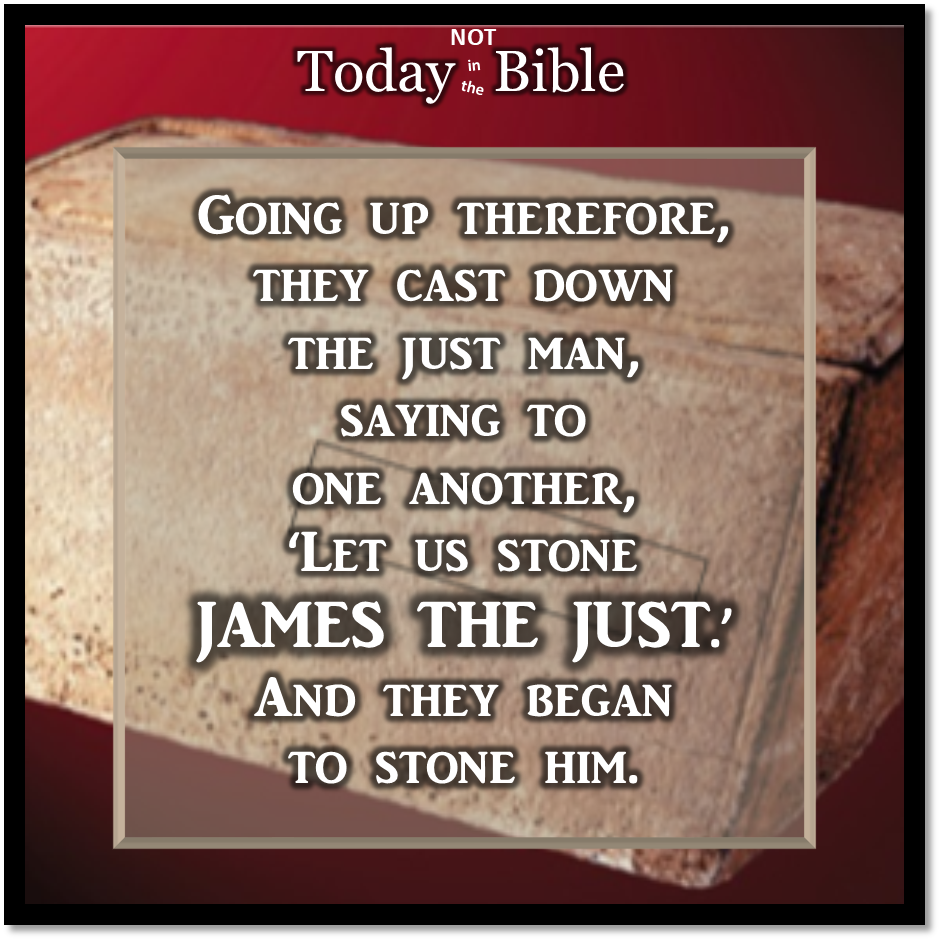Nisan 19, 5784; from sunset April 26, 2024, to sunset April 27, 2024

This is the name “Ya’akov” (Jacob in Hebrew / James in Greek) as seen on the “James Ossuary.” An ossuary is a box which contains the bones of a deceased person. An inscription on the ossuary translates to “James, son of Joseph, brother of Jesus.” In Aramaic, it reads, “Ya’akov, bar Yosef, achui d’Yeshua.”
In 2002, the existence of the ossuary was announced to the public. It became the center of a seven-year trial in Israel regarding forgery and illegal antiquities trading. While the ossuary itself was deemed to be authentic first century, many believe the inscription to be a forgery – while others vehemently maintain its validity. The trial did not make a determination either way on the authenticity of the inscription. Illegal antiquities trading and forgeries have become a huge problem in Israel making it hard to determine the authenticity of many ancient biblical finds.
Jesus’ brother, James, became head of the assembly of believers in Jerusalem. He is credited with writing the book of James, and by all accounts, he lived a righteous life and was respected by many. His only “problem”? He believed his brother to be the Messiah and was extremely fruitful at converting others into the faith. During a change in leadership in Judea, his enemies seized the opportunity to plot against him. He met his demise sometime during the feast of Passover. Below is an early account of his life and death by Eusibius, who quotes Clement, Hegesippus, and Josephus. The year of his death has been dated anywhere from 61 to 69 CE, some 30-40 years after the resurrection.
But the Jews, after Paul had appealed to Caesar, and had been sent by Festus to Rome, frustrated in their hope of entrapping him by the snares they had laid, turn themselves against James, the brother of the Lord, to whom the episcopal seat at Jerusalem was committed by the apostles. The following were their nefarious measures also against him. Conducting him into a public place, they demanded that he should renounce the faith of Christ before all the people; but contrary to the sentiments of all, with a firm voice, and much beyond their expectation, he declared himself fully before the whole multitude, and confessed that Jesus Christ was the Son of God, our Savior and Lord.
Unable to bear any longer the testimony of the man, who, on account of his elevated virtue and piety was deemed the most just of men, they seized the opportunity of licentiousness afforded by the prevailing anarchy, and slew him.
For as Festus died about this time in Judea, the province was without a governor and head. But, as to the manner of James’s death, it has been already stated in the words of Clement, that he was thrown from a wing of the temple, and beaten to death with a club.
Hegesippus also, who flourished nearest the days of the apostles, in the fifth book of his Commentaries gives the most accurate account of him, thus:
“But James, the brother of the Lord, who, as there were many of this name, was surnamed the Just by all, from the days of our Lord until now, received the government of the church with the apostles.
This apostle was consecrated from his mother’s womb. He drank neither wine nor fermented liquors, and abstained from animal food. A razor never came upon his head, he never anointed with oil, and never used a bath. He alone was allowed to enter the sanctuary. He never wore wool, but linen garments. He was in the habit of entering the temple alone, and was often found upon his bended knees, and interceding for the forgiveness of the people; so that his knees became as hard as camel’s, in consequence of his habitual supplication and kneeling before God. And indeed, on account of his exceeding great piety, he was called the Just, and Oblias (or Zaddick and Ozleam) which signifies justice and protection of the people; as the prophets declare concerning him. Some of the seven sects, therefore, of the people, mentioned by me above in my Commentaries, asked him what was the door to Jesus? And he answered, ‘that he was the Savior.’” From which, some believed that Jesus is the Christ.
But the aforesaid heresies did not believe either a resurrection, or that he was coming to give to every one according to his works; as many however, as did believe did so on account of James. As there were many therefore of the rulers that believed, there arose a tumult among the Jews, Scribes, and Pharisees, saying that there was danger, that the people would now expect Jesus as the Messiah. They came therefore together, and said to James, “We entreat thee, restrain the people, who are led astray after Jesus, as if he were the Christ. We entreat thee to persuade all that are coming to the feast of the Passover rightly concerning Jesus; for we all have confidence in thee. For we and all the people bear thee testimony that thou art just, and thou respectest not persons.
Persuade therefore the people not to be led astray by Jesus, for we and all the people have great confidence in thee. Stand therefore upon a wing of the temple, that thou mayest be conspicuous on high, and thy words may be easily heard by all the people; for all the tribes have come together on account of the Passover, with some of the Gentiles also.
The aforesaid Scribes and Pharisees, therefore, placed James upon a wing of the temple, and cried out to him, ‘O thou just man, whom we ought all to believe, since the people are led astray after Jesus that was crucified, declare to us what is the door to Jesus that was crucified.’ And he answered with a loud voice, ‘Why do ye ask me respecting Jesus the Son of Man? He is now sitting in the heavens, on the right hand of great Power, and is about to come on the clouds of heaven.’
And as many were confirmed, and gloried in this testimony of James, and said, ‘Hosanna to the son of David,’ these same priests and Pharisees said to one another, ‘We have done badly in affording such testimony to Jesus, but let us go up and cast him down, that they may dread to believe in him.’ And they cried out, ‘Oh, oh, Justus himself is deceived,’ and they fulfilled that which is written in Isaiah, ‘Let us take away the just, because he is offensive to us; wherefore they shall eat the fruit of their doings.’ (Isaiah 3:10)
Going up therefore, they cast down the just man, saying to one another, ‘Let us stone James the Just.’ And they began to stone him, as he did not die immediately when cast down; but turning round, he knelt down saying, ‘I entreat thee, Lord God and Father, forgive them, for they know not what they do.’
Thus they were stoning him, when one of the priests of the sons of Rechab, a son of the Rechabites, spoken of by Jeremiah the prophet, cried out saying, “Cease, what are you doing? Justus is praying for you.” And one of them, a fuller (launderer), beat out the brains of Justus with the club that he used to beat out clothes.
Thus he suffered martyrdom, and they buried him on the spot where his tombstone is still remaining, by the temple. He became a faithful witness, both to the Jews and Greeks, that Jesus is the Christ. Immediately after this, Vespasian invaded and took Judea.
“Such is the more ample testimony of Hegesippus, in which he fully coincides with Clement. So admirable a man indeed was James, and so celebrated among all for his justice, that even the wiser part of the Jews were of opinion that this was the cause of the immediate siege of Jerusalem, which happened to them for no other reason than the crime against him. Josephus also has not hesitated to superadd this testimony in his works: “These things,” says he, “happened to the Jews to avenge James the Just, who was the brother of him that is called Christ, and whom the Jews had slain, notwithstanding his pre-eminent justice.” – Eusebius



You must be logged in to post a comment.